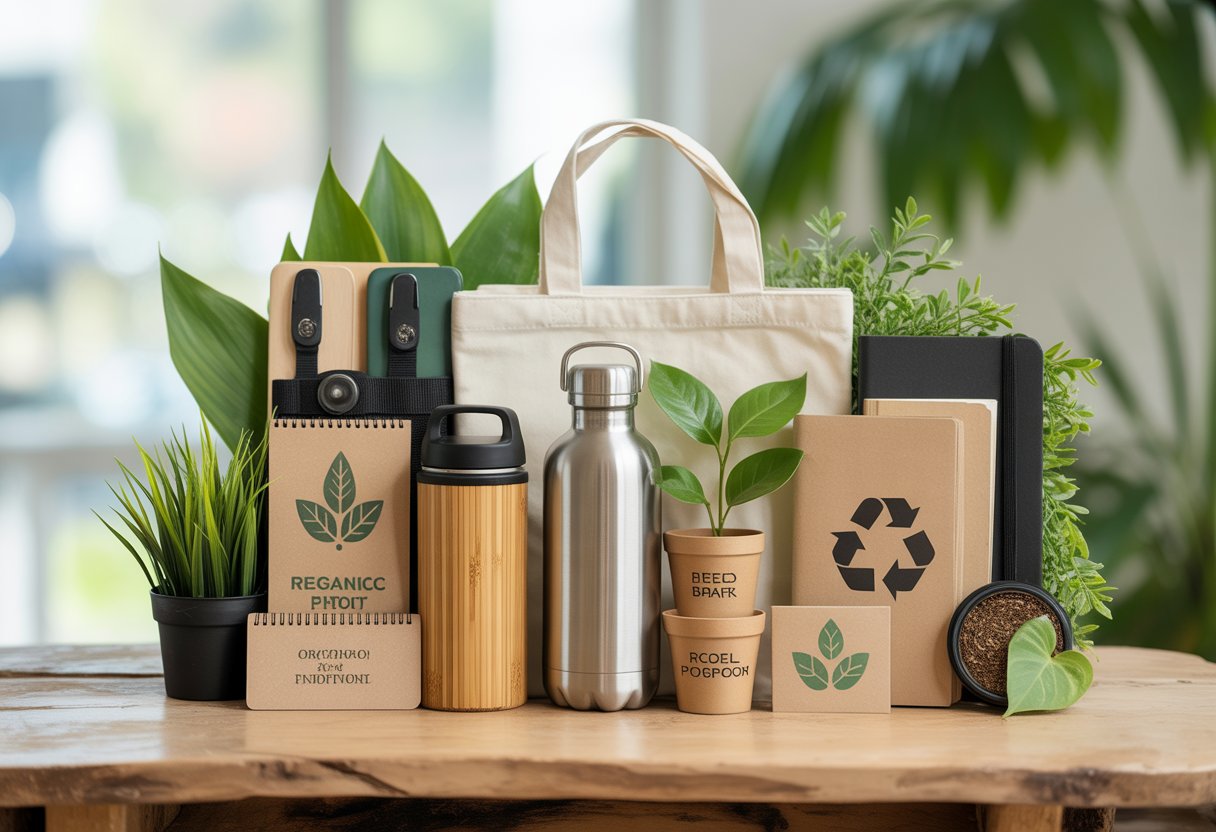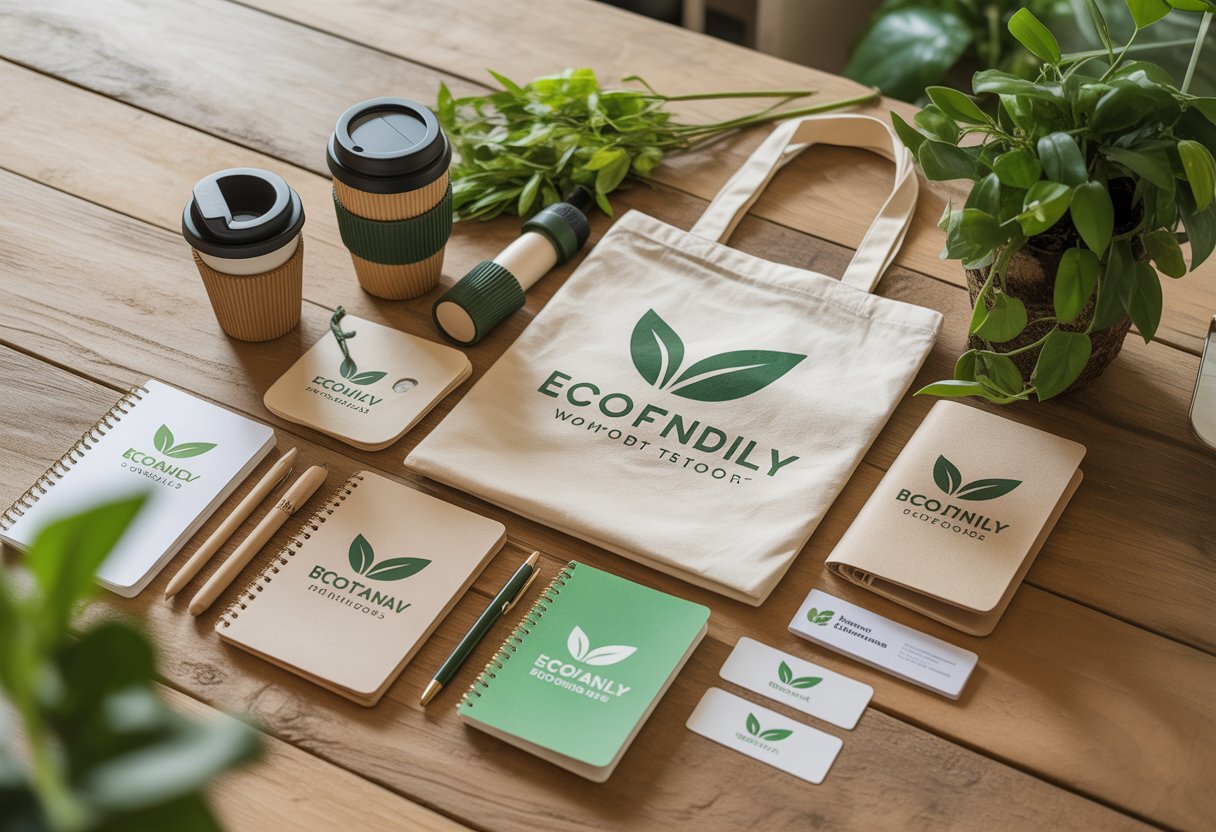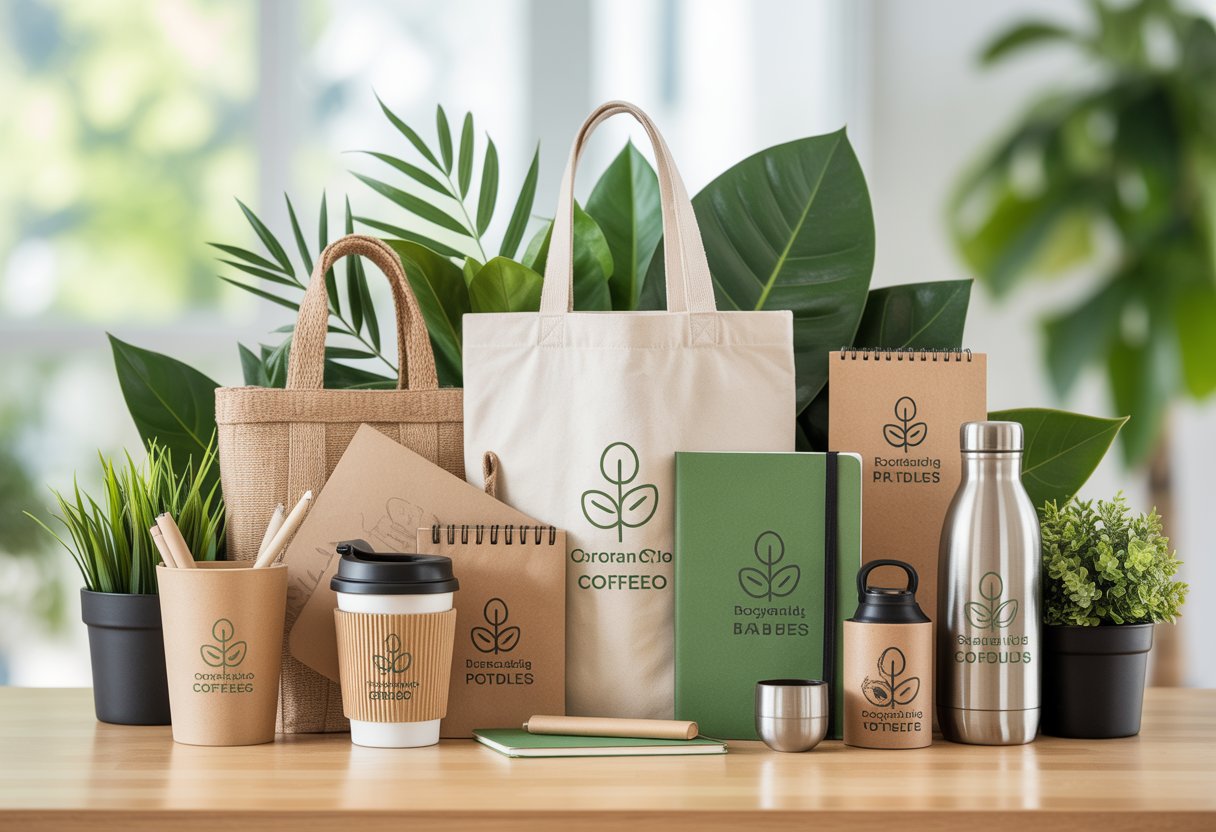Eco-friendly promotional products allow brands to promote themselves responsibly, making a positive impact on the environment and meeting customer expectations for sustainability. As more people want to support businesses that care about the planet, using items made from recycled or natural materials helps companies stand out in a crowded market. Choosing products like reusable bags, biodegradable pens, and recycled notebooks shows real commitment instead of just talking about being green.
Sustainable branding is not just a trend; it’s quickly becoming the standard for brands of all sizes. By offering eco-friendly merchandise, companies can build trust, improve their reputation, and strengthen customer loyalty. These choices signal that a brand is thinking about the bigger picture, not only short-term gain.
Brands ready to make this change can find many creative ways to align their marketing with eco-conscious values. This guide explores the best options and practical steps to make promotional efforts both effective and environmentally friendly.
Why Eco-Friendly Promotional Products Matter

Eco-friendly promotional products are changing how businesses approach brand reputation, environmental responsibility, and consumer loyalty. Choosing sustainable promotional items can help a brand stand out while showing clear concern for the planet.
Building Brand Trust Through Sustainability
Sustainable branded merchandise sends a powerful message. When a company hands out eco-friendly promotional products like FSC®-certified notebooks or reusable bags, it shows commitment to responsible practices. This transparency matters to clients and partners.
Businesses that invest in sustainable promotional products often gain higher trust from their audiences. For example:
| Regular Merch | Eco-Friendly Merch |
|---|---|
| Plastic Pens | Bamboo Pens |
| Standard Totes | Recycled Material Totes |
Making these conscious choices demonstrates to stakeholders that a brand values long-term responsibility over immediate convenience. The result is stronger loyalty and more positive word-of-mouth.
Reducing Environmental Impact
Switching to eco-friendly promotional items directly helps reduce a brand’s carbon footprint. Products made from recycled materials or organic cotton use fewer new resources and keep waste out of landfill. A company can promote itself while lowering its effect on the environment.
Items such as reusable water bottles or bamboo desk organisers are practical. They encourage customers to avoid single-use plastics, which limits pollution. Choosing branded merchandise that is made for constant reuse helps keep waste streams smaller.
Many buyers and clients now expect brands to take responsibility for their environmental impact. Sustainable promotional products show that a business cares about the bigger picture and not just short-term sales.
Aligning With Consumer Values
Consumer values are shifting to favour brands who act responsibly. More people today look for companies with strong ethics and meaningful sustainability efforts. Branded merchandise that is eco-friendly helps connect with these values.
A few examples of products that match consumer priorities:
- Tote bags made from recycled fabric
- Notebooks with biodegradable covers
- Bottles made from plant-based materials
Items like these reinforce the perception that a business listens and adapts to public concerns. Aligning product choices with consumer values can make the brand more relatable and attractive, especially among younger or eco-conscious groups. This type of promotional strategy signals both awareness and action.
Core Principles of Sustainable Branding

Sustainable branding involves more than just using eco-friendly materials. It also requires honest business practices, ethical sourcing, and thoughtful approaches to waste. The choices brands make with their promotional products and branded merchandise can directly affect their environmental impact and public image.
Understanding Sustainable Materials
Choosing sustainable materials is a key step for any brand that wants to lower its carbon footprint. These materials often include recycled paper, organic cotton, bamboo, or plant-based plastics. They are renewable, biodegradable, or produced using less energy and water.
When businesses select branded merchandise made from such materials, they send a clear message about their values. For example, a canvas tote made from certified organic cotton eliminates the need for single-use plastic bags. A branded water bottle made from recycled aluminium has a much lower overall environmental cost than its plastic counterpart.
Transparency is essential. Companies should state exactly what materials were used and how they were sourced. This builds trust and lets customers make informed choices.
Corporate Social Responsibility in Brand Promotion
Corporate social responsibility (CSR) involves more than reducing environmental harm. It includes treating workers fairly, supporting communities, and being ethical in all business dealings. When promoting a brand, using sustainable promotional products helps connect with customers who care about these issues.
Ethical sourcing of merchandise—like ensuring fair wages and safe work conditions—shows a commitment that goes beyond profit. It also improves the brand’s reputation and can make it stand out in the market.
Brands that include CSR in their messaging are more likely to build lasting relationships with customers. Clear communication about the social impact of branded products—for instance, stating if a product was made in a fair trade factory—makes these efforts visible and credible.
Lifecycle and Waste Reduction Strategies
To minimise waste, brands need to think about the whole lifecycle of the promotional product—from raw material to disposal. It starts by designing products that are reusable, recyclable, or compostable, which limits the amount of waste heading to landfill.
Product durability matters. Items like metal water bottles or sturdy tote bags can be used repeatedly, preventing single-use items from piling up in bins. Many brands also offer take-back or recycling schemes, where customers can return used goods for responsible disposal.
A simple checklist can help:
| Step | Example |
|---|---|
| Choose durability | Select long-lasting materials |
| Design for recycling | Use parts that are easy to separate |
| Offer disposal guides | Provide instructions for end-of-life care |
Reducing waste not only supports the environment but also cuts long-term costs and boosts brand image as responsible and forward-thinking.
Popular Eco-Friendly Promotional Products
Many businesses are switching to sustainable promotional products to reduce their environmental impact. Items made from recycled, biodegradable, or organic materials are especially popular and show clear brand commitment to sustainability.
Organic Cotton Tote Bags
Organic cotton tote bags are a staple choice for eco-friendly branded merchandise. They are made using organic cotton, which is grown without harmful pesticides or synthetic fertilisers.
These tote bags are strong and reusable for everyday shopping or carrying books. Their wide, flat surfaces make them ideal for adding logos and marketing messages.
People often prefer organic cotton tote bags because they are durable and can replace single-use plastic bags. By giving these as promotional giveaways, brands help reduce plastic waste while offering something practical.
Most suppliers offer several sizes and colours. Some feature reinforced handles or pockets, boosting their functionality. Organic cotton tote bags are easy to wash and maintain, which increases their lifespan and visibility for brands.
Eco-Friendly Apparel
Eco-friendly apparel, such as t-shirts, polos, and hoodies, uses materials like organic cotton, bamboo, or recycled polyester. These clothing items produce lower environmental impact during manufacturing and wear.
Brands often print their logos directly onto the fabric, turning recipients into ambassadors. Eco-friendly clothing appeals to staff and customers who want comfortable items that reflect their values.
Many suppliers now certify their eco-friendly apparel through standards like GOTS (Global Organic Textile Standard) or OEKO-TEX. This offers peace of mind that the clothing meets strict environmental and social criteria.
When used as branded merchandise, these clothes combine style, visibility, and sustainability. People tend to keep and wear comfortable, high-quality garments, which offers long-lasting promotion for the brand.
Recycled and Biodegradable Stationery
Recycled and biodegradable stationery is important for offices, events, and schools. Products like pens, pencils, and notebooks now use recycled paper, cardboard, or biodegradable plastics.
These items work as everyday essentials, making them practical choices for sustainable promotional products. Companies often stamp their logos on the covers or barrels for regular exposure.
Recycled stationery cuts down on landfill waste and saves raw materials. Biodegradable options break down naturally, reducing long-term pollution.
Some sets come in eco-friendly packaging or bundles for greater impact. Notebooks may feature natural covers, and pens can use wheat straw or recycled plastic. This variety allows businesses to match their brand image with their sustainability goals.
Reusable Drinkware and Food Containers
Reusable drinkware such as stainless steel water bottles, bamboo coffee cups, and glass mugs feature heavily in eco-friendly giveaways. These reduce reliance on single-use plastics and encourage better habits.
Food containers made from recycled plastic, glass, or bamboo are also in demand. They work for meal prep, snacks, and takeaways, making them useful on a daily basis.
Brands often add their logo to these items using laser engraving, screen printing, or wrap-around prints. The combination of usefulness and constant visibility helps brands stay in front of their audience every day.
The materials used are non-toxic and long-lasting. Many designs are leak-proof, BPA-free, and dishwasher-safe. By offering reusable drinkware and food containers, companies show dedication to real-life sustainability, not just marketing.
Integrating Sustainable Merchandise Into Your Marketing Strategy
Sustainable branded merchandise can improve a company’s reputation and reduce its environmental impact. When planned well, eco-friendly promotional products help brands connect with their target audience, stand out at events, and deliver clear, responsible messages.
Effective Distribution at Trade Shows
Trade shows present an opportunity to showcase a brand’s commitment to sustainability. Choosing promotional products made from recycled, biodegradable, or reusable materials communicates a responsible approach. Items like bamboo pens, eco-friendly tote bags, and reusable water bottles attract attention and offer practical use.
Staff should explain the environmental benefits of the merchandise as part of their pitch. This encourages visitors to appreciate the brand’s values, and not just the product’s utility. Distributing fewer, higher-quality items also reduces waste compared to mass giveaways.
A branded display with simple eco-friendly messaging helps reinforce the brand’s stance. Setting up on-site collection points for returns or recycling old promotional items shows extra care for the environment.
Eco-Conscious Packaging and Messaging
Packaging plays a key role in sustainable branding. Brands should select packaging made from recycled paper or compostable materials wherever possible. Avoiding plastic wrapping and excess fill further reduces the environmental footprint.
Clear, simple messaging on packaging can educate recipients about the product’s sustainable features. Consider a short note or printed label sharing details, such as material origin or how to recycle the item responsibly.
Incorporating symbols like the FSC logo or recycling icons helps build trust. Using eco-certifications on packaging signals a genuine commitment and reassures environmentally conscious customers.
Target Audience Engagement
Engagement extends beyond handing out free items. Brands should encourage feedback and invite customers to share their thoughts on sustainable products through surveys or QR codes linked to digital forms.
Interactive activities at events, such as quizzes about recycling or the life cycle of materials, can boost interest while educating attendees. Social media campaigns that encourage people to post photos using eco-friendly promotional products help strengthen brand recognition.
Personalised messaging on merchandise, such as custom names or targeted slogans, increases attachment and usage rates. Brands that listen and respond to audience preferences show respect for customer values and can motivate long-term loyalty.
Measuring the Impact of Eco-Friendly Promotional Products
Measuring the effectiveness of sustainable promotional products means looking at real-world data, customer attitudes, and business goals. Clear metrics help brands see the value of eco-friendly choices and make better decisions for the future.
Assessing Carbon Footprint Reduction
Calculating the carbon footprint reduction starts with looking at the materials used in promotional items. Eco-friendly products made from bamboo, recycled plastics, and organic cotton tend to have a smaller carbon footprint than single-use plastics or non-renewable materials.
Life cycle analysis (LCA) can help brands track emissions from raw material sourcing, manufacturing, transportation, and end-of-life disposal. Companies can then report reductions in greenhouse gases compared to traditional products.
A simple table like the one below can help present this data:
| Product Type | Material | Estimated CO₂ Savings per Item |
|---|---|---|
| Bamboo Pen | Bamboo | 15g |
| Tote Bag | Recycled Cotton | 50g |
| Water Bottle | Recycled Plastic | 30g |
Presenting this information gives transparency and supports a brand’s sustainability claims.
Monitoring Brand Perception
Eco-friendly promotional products can influence how customers see a brand. Brands often use surveys and feedback forms to measure changes in brand perception after launching a sustainable giveaway campaign.
Key metrics to track include:
- Brand trust
- Willingness to recommend
- Perceived environmental responsibility
For clearer results, companies can compare customer responses before and after distributing eco-friendly items. Digital listening tools may also help track mentions of the brand and its sustainability efforts on social media and review platforms.
Positive feedback and higher trust scores often show the effectiveness of green promotional strategies.
Setting and Tracking Sustainability Goals
Brands can set specific goals for their sustainable promotional product campaigns. Examples include sourcing a certain percentage of items from recycled materials, reducing packaging waste, or achieving a target for carbon emissions savings.
Steps to track progress:
- Define clear, measurable objectives.
- Regularly check supplier certifications (FSC, Fairtrade, etc.).
- Monitor product and packaging data.
- Review outcome metrics, like number of items distributed and estimated total emissions saved.
Using this approach keeps sustainability efforts on track and helps align promotional activities with wider environmental goals. Regular reporting builds trust with stakeholders and shows a real commitment to eco-friendly practices.




